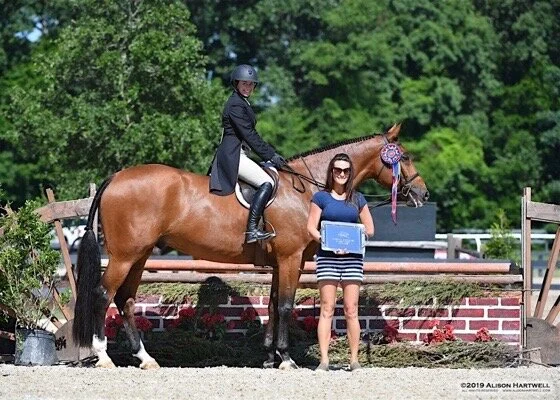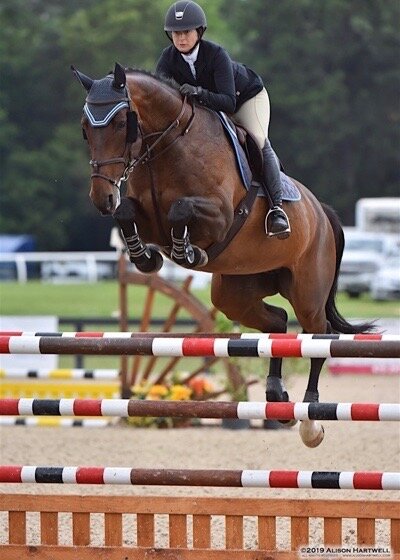Lee Hughes of Promenade Farm
HorseWorks Insurance Specialists
Can you tell us about your business, Promenade Farm?
Promenade Farm is a hunter/jumper facility with an 18 stall barn, an all weather riding arena, grass ring, and many trails. We sit on 50 acres just outside of downtown Athens, GA. We compete primarily on the “A” circuit throughout the southeast. It is a goal oriented program, that has a strong foundation in good horsemanship.
How did you get your start as a professional?
I began as an assistant trainer for Keri Kampsen in Burbank, CA. I took care of the riding and teaching at home, while she was on the road. I had previously taken nine years off from riding and was working in the fashion industry out of college. I realized, sooner rather than later, thankfully, that I really missed the horses and I definitely wasn't happy sitting in a cubicle working a 9 to 5 job. Keri remembered me from my junior days and gave me an amazing opportunity to get back into the horse world.
You ran your business in California for a while. What are the similarities and differences of working on the west coast, as opposed to the east coast?
The biggest difference in running a business in Northern California versus Georgia is just the cost of land. Land is so expensive in CA that it is virtually impossible to own a farm, so you end up boarding and training at a large training facility. Boarding costs are very high, turnout is limited at best and primarily on dirt, and rings are shared. It makes for a more rigid program, and it's definitely more limiting to the riders that don’t have deep pockets. There is such a stigma of everything being so perfect and controlled at all times that you end up losing some of the fun. All horses had to be in full care and full training in my CA program. It is expected, and with such a heavily saturated industry you have to tailor your programs in order to be comparable in price and training regimes. I don’t really agree with that way of life for the horses and I really enjoy being able to provide a more sustainable way of life for them here in GA. I have restructured my program to offer different training packages that work for different budgets and goals as well, and my horses get all day turnout! Every horse still gets ridden six days a week, but there is an ease to their way of life that is reflected in their way of going. I show so much now, as we did in CA, which is 1-2 weeks a month throughout the year, but it is more enjoyable now since we have a greater choice of venues to choose from. In CA, we always showed in CA, and primarily at two main venues in Northern California. I now show in multiple states and I love the diversity in venues and competition. I think it makes for a more well rounded competition experience.
Can you explain your training model? How do you put horses and clients in the best position to succeed?
I firmly believe that every rider needs a proper foundation. I'm not afraid to go back to the basics with a riders position, aids, and basic flatwork. I also emphasize that riding is a partnership. Every time you sit on your horse, every day you come to the barn, you have to be willing to put in 100% and understand your own strengths and weaknesses, along with those of your horses. My clients are taught proactive riding, not reactive riding. They are encouraged to be thoughtful riders and to have a full understanding of their “tool box." My horses are kept fit, and mentally and physically sound, by having a nice mix of flatting, lessons, and trail riding.
Where do you personally find the most gratification in your career?
For me personally, I really love developing young horses. I have had the opportunity to start multiple horses and develop them into their show careers. I love seeing them learn new things and have their own “aha” moments. I take such great satisfaction in all of the little milestones. I take great pride in instilling good manners on the ground and under saddle, and adding all of the little buttons that another rider would find enjoyable. I want to make sure I set up each horse to have a great life with their next owner.
When it comes to your show schedule, where do you spend your time on the road and why?
I primarily show at Bruce's Field in Aiken, SC and Tryon, NC. Both venues are an easy 2.5 hour drive from my farm. I love that they have permanent stabling, good footing, and nice places to stay. My clients personally love Aiken, as we all love the town for its charm and excellent restaurants. I personally like Aiken as well because the venue is smaller and there are always places to lunge or ride throughout the day. It's also a nice place to bring a young horse.
How do you find a work/life balance seeing as you live at your farm?
Honestly right now, I don’t really do much outside of work. Living on a busy 50 acre farm requires constant care and management. I have been working every day since Covid struck, and I am hoping to start taking Mondays off again!
Do you have any personal riding aspirations you'd like to achieve? If so, what would those be?
I have always wanted to compete at the International Derby Finals. I would also like to win a Grand Prix. The closest I've come is third!
What professional(s) do you look up to the most and why?
There are so many amazing professionals that I admire and would love to emulate. McLain Ward, as he’s not only one of the most technically proficient riders but he is also an amazing spokesman for our sport. Beezie Madden for her feel, eye, balance, and disciplined work ethic. Jimmy Torano who can so effortlessly apply his skills in the hunters and in the jumpers, and has such a direct and unwavering point of view, which is most often correct. There are so many others and I truly believe you can learn something from everyone, but these individuals always stand out for me.
What advice do you have for young, aspiring professionals in the horse industry?
Be prepared to work hard. You have to be willing to do everything, see everything, and care about everything if you want to be successful. Treat every horse in your care like it's your own, and be willing to prioritize your clients needs and horses needs before your own. There is no task beneath you. This is a humbling and oftentimes thankless job, but it is exceedingly rewarding in so many ways.




